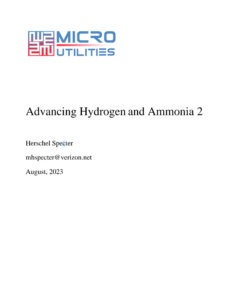Full Title: Advancing Hydrogen and Ammonia 2
Author(s): Herschel Specter
Publisher(s): Micro Utilities
Publication Date: August 18, 2023
Full Text: Download Resource
Description (excerpt):
Attitudes about a hydrogen economy vary dramatically. Some say that hydrogen is one of the most difficult substances to work with and most of what we hear is hype. Others claim that hydro gen holds enormous environmental and economic promise. In 2017 the Hydrogen Council offered a vision of the hydrogen economy for year 2050 with an annual income of $2.5 trillion dollars and 30 million new jobs. Unlike fossil fuels, when hydrogen is burned it produces water, not carbon dioxide (CO2). Hydrogen networks are being planned in Europe and large demonstration projects are underway in the United States and elsewhere.
This report argues that neither fully rejecting the use of hydrogen nor embracing projected sweeping uses of hydrogen is appropriate. Instead, a more practical series of steps is recommended here in the development of hydrogen and ammonia. Specifically, this approach would be a hydrogen (including ammonia) economy without massive hydrogen or ammonia storage facilities and without extensive distribution networks using piping systems similar to our present natural gas distribution system. Hydrogen storage facilities and hydrogen distribution networks have technical issues, add considerable costs, require greater land use, have safety issues, and would be the main locations for hydrogen leakage. The loss of hydrogen through leakage is an added expense, a potential safety concern, and is now identified by the Environmental Defense Fund as an important climate change issue.
In addition to eliminating hydrogen storage and distribution networks, it is recommended that two popular hydrogen applications, using hydrogen to make electricity and using hydrogen for space heating and making hot water in the residential and commercial sectors, be deferred until the hydrogen economy is much more developed. At this time these two applications do not look practical. Further, these are the only two hydrogen applications that would require a significant hydro gen storage and distribution systems. Other hydrogen applications have hydrogen generation, such as by using electrolyzers, co-located with the equipment that uses this hydrogen.
